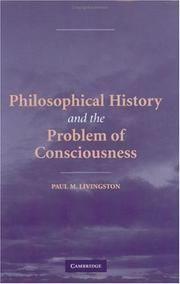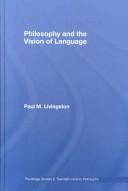| Listing 1 - 9 of 9 |
Sort by
|

ISBN: 0521838207 0521122678 1107162106 0511215576 0511217366 0511315945 0511497954 1280540699 0511211996 051121376X 9780511211997 9780521838207 9780511215575 9780511217364 9780511497957 9781280540691 Year: 2004 Publisher: Cambridge, UK ; New York : Cambridge University Press,
Abstract | Keywords | Export | Availability | Bookmark
 Loading...
Loading...Choose an application
- Reference Manager
- EndNote
- RefWorks (Direct export to RefWorks)
The problem of explaining consciousness remains a problem about the meaning of language: the ordinary language of consciousness in which we define and express our sensations, thoughts, dreams and memories. This book argues that the problem arises from a quest that has taken shape over the twentieth century, and that the analysis of history provides new resources for understanding and resolving it. Paul Livingston traces the development of the characteristic practices of analytic philosophy to problems about the relationship of experience to linguistic meaning, focusing on the theories of such philosophers as Carnap, Schlick, Neurath, Husserl, Ryle, Putnam, Fodor and Wittgenstein. Clearly written and avoiding technicalities, this book will be eagerly sought out by professionals and graduate students in philosophy and cognitive science.
Consciousness --- Philosophy --- History. --- History --- Arts and Humanities
Book
ISBN: 9780415891912 0415891914 9780203806630 9781136656699 9781136656736 9781136656743 9781138016767 Year: 2012 Volume: 27 Publisher: London ; New York Routledge
Abstract | Keywords | Export | Availability | Bookmark
 Loading...
Loading...Choose an application
- Reference Manager
- EndNote
- RefWorks (Direct export to RefWorks)
Political science --- Political philosophy --- Philosophy --- Badiou, Alain. --- Wittgenstein, Ludwig, --- Wei-tʻe-ken-ssu-tʻan, --- Wei-tʻe-ken-ssu-tʻan, Lu-te-wei-hsi, --- Wittgenstein, L. --- Vitgenshteĭn, L., --- Wei-ken-ssu-tʻan, --- Pitʻŭgensyutʻain, --- Vitgenshteĭn, Li︠u︡dvig, --- Weitegenshitan, --- Wittgenstein, Ludovicus, --- Vitgenshtaĭn, Ludvig, --- ויטגנשטיין, לודוויג --- 维特根斯坦, --- Badiou, Alain --- Politische Philosophie. --- Politisk filosofi. --- Rezeption. --- Philosophy. --- Badiou, Alain, --- Wittgenstein, Ludwig. --- Wittgenstein, Ludwig Josef Johann, --- Badiou, A. --- Badiu, Alen, --- Badiou, Alan, --- Bādiyū, Ālān, --- Бадиу, Ален, --- باديو, آلان, --- באדיו, אלן, --- アラン・バディウ, --- 巴迪欧, 阿兰,
Book
ISBN: 9780810135192 0810135191 Year: 2017 Publisher: Evanston (Ill.): Northwestern university press,
Abstract | Keywords | Export | Availability | Bookmark
 Loading...
Loading...Choose an application
- Reference Manager
- EndNote
- RefWorks (Direct export to RefWorks)
In The Logic of Being, Paul M. Livingston examines the relationship of truth and time from a perspective that draws on both Martin Heidegger's thought and twentieth-century analytic philosophy. In his influential earlier work The Politics of Logic, Livingston elaborated an innovative "formal" or "metaformal" realism. Here he extends this concept to include a "temporal realism" that accounts for the reality of temporal change and becoming while also preserving realism about logic and truth. Livingston's formal and phenomenological analysis articulates and defends a realist position about being, time, and their relationship that understands that all of these are structured and constituted in a way that does not depend on the human mind, consciousness, or subjectivity. This approach provides a basis for new logically and phenomenologically based accounts of the structure of linguistic truth in relation to the appearance of objects and of the formal structure of time as given. Livingston draws on philosophers from Plato and Aristotle to Davidson and Heidegger in this exploration. In it, readers and scholars will discover innovative connections between continental and analytic philosophy.
Ontology --- Realism --- Space and time --- Heidegger, Martin, --- Heidegger, Martin, - 1889-1976

ISBN: 9780415961141 Year: 2008 Publisher: New York London Routledge
Abstract | Keywords | Export | Availability | Bookmark
 Loading...
Loading...Choose an application
- Reference Manager
- EndNote
- RefWorks (Direct export to RefWorks)
Book
ISBN: 9781138787360 9781315766621 9781317660989 9781317660996 9781138302181 1138787361 Year: 2015 Publisher: London: Routledge,
Abstract | Keywords | Export | Availability | Bookmark
 Loading...
Loading...Choose an application
- Reference Manager
- EndNote
- RefWorks (Direct export to RefWorks)
This forward-thinking collection presents new work that looks beyond the division between the analytic and continental philosophical traditions―one that has long caused dissension, mutual distrust, and institutional barriers to the development of common concerns and problems. Rather than rehearsing the causes of the divide, contributors draw upon the problems, methods, and results of both traditions to show what post-divide philosophical work looks like in practice. Ranging from metaphysics and philosophy of mind to political philosophy and ethics, the papers gathered here bring into mutual dialogue a wide range of recent and contemporary thinkers, and confront leading problems common to both traditions, including methodology, ontology, meaning, truth, values, and personhood. Collectively, these essays show that it is already possible to foresee a future for philosophical thought and practice no longer determined neither as "analytic" nor as "continental," but, instead, as a pluralistic synthesis of what is best in both traditions. The new work assembled here shows how the problems, projects, and ambitions of twentieth-century philosophy are already being taken up and productively transformed to produce new insights, questions, and methods for philosophy today.
Philosophy, Modern --- Analysis (Philosophy) --- Continental philosophy --- Philosophie continentale --- History of philosophy --- Theory of knowledge --- Philosophical anthropology --- Metaphysics --- General ethics --- anno 2000-2009 --- anno 2010-2019 --- Analysis (Philosophy). --- Continental philosophy. --- Philosophie --- Philosophie analytique --- Philosophy, Modern - 21st century
Multi

ISBN: 9781474408301 9781474408295 Year: 2022 Publisher: Edinburgh Edinburgh University Press
Abstract | Keywords | Export | Availability | Bookmark
 Loading...
Loading...Choose an application
- Reference Manager
- EndNote
- RefWorks (Direct export to RefWorks)
Book

ISBN: 9783110670349 9783110666915 9783110666823 3110670348 3110666820 311066691X Year: 2020 Publisher: Berlin Boston
Abstract | Keywords | Export | Availability | Bookmark
 Loading...
Loading...Choose an application
- Reference Manager
- EndNote
- RefWorks (Direct export to RefWorks)
Several debates of the last years within the research field of contemporary realism – known under titles such as "New Realism," "Continental Realism," or "Speculative Materialism" – have shown that science is not systematically the ultimate measure of truth and reality. This does not mean that we should abandon the notions of truth or objectivity all together, as has been posited repeatedly within certain currents of twentieth century philosophy. However, within the research field of contemporary realism, the concept of objectivity itself has not been adequately refined. What is objective is supposed to be true outside a subject’s biases, interpretations and opinions, having truth conditions that are met by the way the world is. The volume combines articles of internationally outstanding authors who have published on either Idealism, Epistemic Relativism, or Realism and often locate themselves within one of these divergent schools of thought. As such, the volume focuses on these traditions with the aim of clarifying what the concept objectivity nowadays stands for within contemporary ontology and epistemology beyond the analytic-continental divide.
Digital

ISBN: 9783110670349 9783110666915 9783110666823 Year: 2020 Publisher: Berlin ;; Boston De Gruyter
Abstract | Keywords | Export | Availability | Bookmark
 Loading...
Loading...Choose an application
- Reference Manager
- EndNote
- RefWorks (Direct export to RefWorks)
Book

ISBN: 9783111386294 Year: 2024 Publisher: Berlin Boston
Abstract | Keywords | Export | Availability | Bookmark
 Loading...
Loading...Choose an application
- Reference Manager
- EndNote
- RefWorks (Direct export to RefWorks)
| Listing 1 - 9 of 9 |
Sort by
|

 Search
Search Feedback
Feedback About UniCat
About UniCat  Help
Help News
News